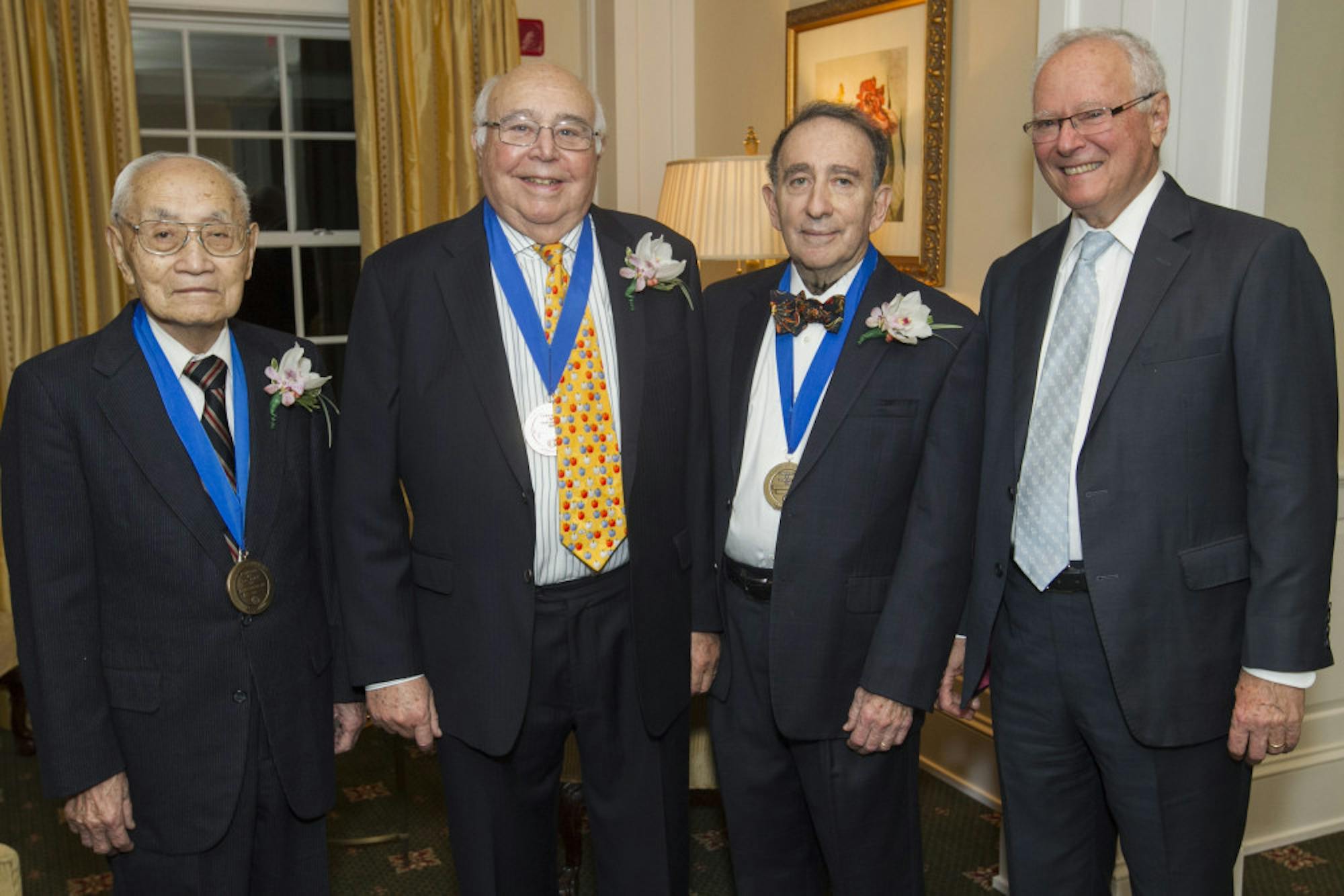Three faculty members at the School of Medicine were awarded Dean’s Medals -- given to individuals who have made extraordinary accomplishments in the medical field -- on Nov. 5.
The recipients of the awards were Te-Wen Chang, a former associate professor of public health and community medicine; Sherwood Gorbach, a former professor of public health and community medicine and Stuart Levy, a current a professor of molecular biology and the director of the Center for Adaptation Genetics and Drug Resistance. The three were recognized at a reception for area alumni at the Wellesley Country Club, which over 200 people attended, according to Dr. Harris Berman, the dean of the School of Medicine.
Berman said the medals -- rarely awarded at Tufts -- were presented to the three individuals for their contributions to the field of infectious disease research. The research conducted by the three award recipients on Clostridium difficile (C. difficile) bacteria, which causes diarrhea and colon inflammation and is linked to around29,000 deaths in the U.S.annually, has led to further related research at the School of Medicine, he said.
“Each of these researchers has made seminal discoveries in infectious diseases, which not only have been a great credit to Tufts, but also a major contribution to improve the health of people all over the world,” Berman said.
Berman said the last time a Dean’s Medal was awarded was four years ago, when it was given to Dr. Vivian Pinn, a former faculty member in the department of pathology.
Gorbach said that before receiving the Dean's Medal, he had no idea that such an award existed at Tufts. The Dean’s Medal represents recognition of his whole life's work, not merely of one achievement, he said.
Gorbach explained that most of his research is about infections in the intestinal tract, which he started studying as a young researcher back in 1964. He cited his experience as a student at the Medical School from 1958 to 1962 as a motivating factor behind his research.
“During those days I was inspired by my teacher, Dr. Louis Weinstein, who taught at Tufts from 1957 till 1975," he said. “It was Dr. Weinstein who made me realize how interesting and challenging this field was."
Throughout his career, Gorbach travelled to various places to conduct research, including Calcutta, India, where he stayed for a year and a half to research diarrhea.
“In 1978, the research in my lab led to the discovery of Australian Clostridium Difficile, a form of diarrhea caused by antibiotics," he said.
Chang, who is now 95, was awarded the Dean's Medal for his contributions to the field of infectious disease research, particularly for his work in understanding C. difficile. He discovered in 1978, working in a Tufts lab under Gorbach's direction, that clostridia, a toxin-producing bacteria, is the cause of antibiotic-associated pseudo-membranous colitis -- inflammation of the colon that sometimes occurs after antibiotic treatment -- according to a Nov. 13 Tufts Now article. In addition to this discovery, Chang conducted over 200 studies on the C. difficile pathogen and other related infectious diseases.
Levy, a researcher, health policy advocate and co-founder of the Alliance for the Prudent Use of Antibiotics -- an international nonprofit organization that aims to fortify defense against infectious diseases on a local scale by promoting appropriate and effective use of antibiotics -- joined the Tufts faculty in 1971 and continues his research on infectious diseases to this day.
“My research is studying antibiotic resistance at the molecular, genetic and biochemical level ... as they impact public health nationally and internationally,” Levy said.
He explained that his research has led to two major discoveries. His team was the first to demonstrate how efflux mechanisms, or cell pumps, expel antibiotics out of a cell to prevent them from interfering with cell growth -- research that shed light on drug resistance in bacteria. His other major discovery, which resulted from his work in multiple drug resistance, concerns a regulatory locus in the bacterial chromosome called mar, which influences drug resistance and organism virulence.
“Multiple drug resistance, by whatever mechanism, leads to the overproduction of the pump and other resistance mechanisms,” Levy said. “The region of the cell which bears the multiple drug resistance gene allows the cell to circumvent the antibiotic activity by various mechanisms for resistance in the bacterial cell.”
In another study, Levy and his team investigated whether or not feeding farm animals low doses of antibiotics could lead to the appearance of drug-resistant bacteria in the animals and farm workers.
“Before our studies, people thought that the farm animals had different kinds of bacteria and resistance genes that they carry,” Levy said. “However, we showed that as the animals move from farms to retail markets, they carry with them bacteria, which are selected for antibiotic resistance during the use of antibiotics and raising of the animals.”
According to Levy, his team's studies were the first to show transfer of drug resistance genes from animals to humans and vice-versa. He said it was this research that ultimately won him the Dean's Medal.
Three School of Medicine faculty members awarded Dean's Medals for their research






